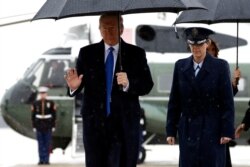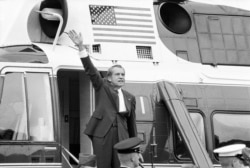U.S. President Donald Trump is in London this week to attend the NATO summit as his impeachment fight back home enters a new phase.
"It will never end, because they want to do what they want to do," Trump said to reporters as he left the White House, referring to Democrats' impeachment inquiry.
With Democrats beginning hearings on drafting the articles of impeachment Wednesday, many leaders of the North Atlantic Treaty Organization are well aware of the pressures Trump is facing at home.
Impeachment hearings "eat up a considerable amount of time" for the president and his closest advisers, said Gary Schmitt, resident scholar in strategic studies and American institutions at the American Enterprise Institute. "You'll see a very distracted president for sure," Schmitt said.
However, Trump's impeachment will not likely impact discussions among NATO member countries whose leaders "probably anticipate that the president will be impeached but won't be removed from office," said Schmitt.
"They know that at least for the next year they'll be dealing with President Trump and his administration so they'll plan accordingly," he said.
This is not the first time Trump will be facing world leaders under the threat of impeachment. Speaker Nancy Pelosi announced the formal House impeachment inquiry against the president on Sept. 24, the same day Trump gave a speech in front of the 74th session of the United Nations General Assembly in New York.
Echoes of Nixon
Trump is not the first U.S. president to attend a NATO meeting as his impeachment looms. In June 1974, Richard Nixon was in Brussels attending a summit commemorating NATO's 25th anniversary as the House Judiciary Committee was concluding its impeachment inquiry. Nixon stepped down a few weeks later.
When Trump meets leaders at NATO's gathering to celebrate its 70th year, he will do so "with the confidence he will likely survive Nixon's fate," said Derek Chollet, Executive Vice President for Security and Defense Policy at the German Marshall Fund of the United States.
Chollet added that as Nixon did in 1974, Trump will strive to project a sense of normalcy in the summit. "As Congress debates his future, Trump will still have extra incentive to show that he's in command," he said.
The parallel between Trump and Nixon doesn't end with impeachment.
The 1974 summit was also a period in which the Europeans worried about the United States withdrawing from Europe, said Hans Kundnani, senior research fellow in the Europe Program at Chatham House.
Kundnani added that Europeans in general are hoping that Trump won't stay in office, but they are aware enough of the process to know that Republicans are unlikely to convict in the Senate.
"The hope is more that Trump won't be re-elected, rather than that he will be convicted and removed from office before the election," Kundnani said. "I don't think it will particularly affect the way that the NATO summit functions."
Bilateral meetings
On the sidelines of the summit, Trump is expected to hold bilateral meetings, including with French President Emmanuel Macron who has been advocating "strategic autonomy" for NATO members, stressing that amidst concerns of U.S. commitment to the alliance, Europeans must not rely too much on American security guarantees.
Macron sharply criticized Trump after he withdrew American forces from northeastern Syria in October without consulting NATO allies, saying that the decision represents the "brain-death of NATO."







